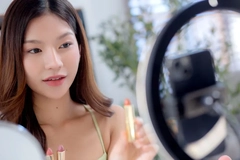EU pressured to uphold cruelty-free cosmetics amid regulatory revisions
Key takeaways
- EU lawmakers and NGOs warn that upcoming regulatory revisions could weaken EU cosmetic animal testing bans.
- An open letter urges EU regulators to uphold their promise of cruelty-free cosmetics by reinforcing bans, closing legal loopholes, and investing in modern, non-animal testing methods.
- The debate unfolds against a global backdrop of efforts to restrict or replace cosmetic animal testing.

Members of the European Parliament (MEPs) and NGOs have called for the defense and strengthening of cosmetic animal testing bans.
In an open letter to three European commissioners, the signees requested the promotion of cruelty-free scientific innovation and demonstrable change toward removing animal testing, as signified in the Commission’s roadmap.
The communication has come ahead of proposals to revise the EU REACH (Registration, Evaluation, Authorization, and Restriction of Chemicals) regulation and follows a consultation on the Cosmetic Products Regulation (CPR).
“We are very concerned about what the European Commission has in mind for the revision of the CPR,” says Dr. Emma Grange, Cruelty Free Europe’s director of Science and Regulatory Affairs.

“It is already not fit for purpose and the regulation must be strengthened, not weakened. In line with the commission’s roadmap for transition away from animal testing, innovation within EU industry must be supported by investing in humane, modern non-animal testing methods delivering a high level of protection for human health and the environment.”
Keeping or breaking promises
In 2013, the EU implemented a complete marketing ban on animal testing for cosmetics. It prohibited the sale of any cosmetic products containing ingredients that had been tested on animals, regardless of where the testing occurred.
The letter called the EU bans on animal testing for cosmetics a landmark achievement. It said EU citizens were promised cruelty-free cosmetics, but now “hard-won protections are under threat.”
 MEPs and NGOs push to protect EU cosmetic animal testing bans. According to the nine MEPs and 14 NGOs, the bans are being eroded by new regulatory suggestions and inconsistencies. They say public trust in Europe’s commitment to protecting animals and advancing humane science will erode in tandem.
MEPs and NGOs push to protect EU cosmetic animal testing bans. According to the nine MEPs and 14 NGOs, the bans are being eroded by new regulatory suggestions and inconsistencies. They say public trust in Europe’s commitment to protecting animals and advancing humane science will erode in tandem.
Thus, the letter asks EU regulators to “uphold the promise” it made to its constituents by maintaining and reinforcing animal testing bans.
It urges boosting R&D and regulatory acceptance of non-animal methods. The writers push that the continuous phasing out of animal testing for chemical safety assessment is ambitious and actionable.
“This roadmap should serve as a launch pad for a broader EU strategy to enable the phase-out of animal testing across all areas of science, positioning Europe as a global leader in humane, human-relevant innovation,” they say.
The letter explains that ethical policy decisions have saved animal lives and driven innovation. “[The EU bans] sparked scientific innovation, drove advances in non-animal safety assessment, and set a global standard for animal protection.”
Cruelty Free Europe says that non-animal methods for ensuring the safety of cosmetics are well established and widely used to test ingredients in other types of consumer products.
The letter is specifically addressed to: Stéphane Séjourné, executive VP for prosperity and industrial strategy; Olivér Várhelyi, commissioner for health and animal welfare; and Jessika Roswall, commissioner for environment, water, and resilience and a competitive circular economy.
Legal loopholes
Animal rights advocates have flagged concerns surrounding contradictory tensions between the EU’s CPR and REACH. The open letter says this misalignment weakens the cosmetics animal testing ban.
The CPR aims to ensure the safety of products and ingredients by relying on human-relevant, non-animal tests, but REACH mandates a prescribed list of test data, often requiring tests on animals.
REACH’s animal testing requirements have reportedly received precedence over the CPR. In 2023, the European Court of Justice required Symrise to conduct animal tests on two of its sunscreen ingredients, citing REACH requirements.
Cruelty Free Europe is advocating for an amendment to the CPR that clarifies that its animal testing bans supersede other EU chemicals laws, such as REACH. Legal loopholes threaten the EU’s cruelty-free cosmetics pledge.
Legal loopholes threaten the EU’s cruelty-free cosmetics pledge.
“In accord with the call from the European Citizens’ Initiative to Save Cruelty Free Cosmetics, and the wishes of MEPs, not only does the ban need to be protected, it needs to be improved to finally deliver what EU legislators promised — the end of testing cosmetics and their ingredients on animals, regardless of which legislation applies,” says Grange.
“Changes to legislation must not erode important progress already made…We believed that animal testing for cosmetics would become a thing of the past, and demand that change is made now so that Europe evolves past the cruel and outdated use of animals.”
In response to the conflicting regulations, PETA (People for the Ethical Treatment of Animals) US recently updated its Beauty Without Bunnies company list to only those that sell their products in the US, Canada, Germany, and India.
Global moves away from animal testing
Earlier this year, Brazil’s Chamber of Deputies approved a landmark law banning the sale of imported cosmetics tested on animals. The law applies to all personal care products tested on vertebrate non-human animals.
The implementation followed Brazil’s ban on domestic animal testing for cosmetics, which took effect in March 2023. However, the former ban only applies to testing in Brazil, not cosmetics sold from other countries.
Meanwhile, the New Zealand government introduced a certification program allowing brands to sell products in brick-and-mortar stores in China without having to undergo animal testing.
 Animal rights groups are warning of potentially weakening EU protections. Last week, Personal Care Insights spoke to Monica Engebretson, head of public affairs for North America at Cruelty Free International, who told us that Canada’s final strategy on animal testing lacks dedicated funding and clear deadlines.
Animal rights groups are warning of potentially weakening EU protections. Last week, Personal Care Insights spoke to Monica Engebretson, head of public affairs for North America at Cruelty Free International, who told us that Canada’s final strategy on animal testing lacks dedicated funding and clear deadlines.
Also in North American regulatory news, in March, a bipartisan group of US lawmakers reproposed the Humane Cosmetics Act to prohibit cosmetic animal testing and the sale of animal-tested beauty products nationwide.
At the time, we spoke to the Personal Care Products Council about how the beauty industry is moving beyond the need for animal testing.













